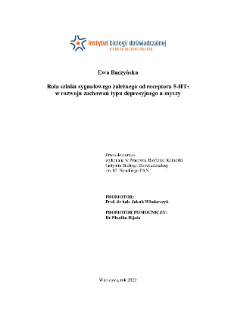- Search in all Repository
- Literature and maps
- Archeology
- Mills database
- Natural sciences
Advanced search
Advanced search
Advanced search
Advanced search
Advanced search

Object
Title: Rola szlaku sygnałowego zależnego od receptora 5-HT7 w rozwoju zachowań typu depresyjnego u myszy : praca doktorska
Institutional creator:
Instytut Biologii Doświadczalnej im. Marcelego Nenckiego PAN
Contributor:
Włodarczyk, Jakub : Supervisor ; Bijata, Monika : Assistant supervisor
Publisher:
Instytut Biologii Doświadczalnej im. Marcelego Nenckiego PAN
Place of publishing:
Description:
117 pages : illustrations ; 30 cm ; Bibliography ; Summary in English
Degree name:
Degree discipline :
Degree grantor:
Nencki Institute of Experimental Biology PAS ; degree obtained: 14.04.2023
Type of object:
Abstract:
Depression is a global medical problem frequently leading to suicides. It is assumed that depressive symptoms occur as a result of aberrant excitatory synaptic plasticity developed after chronic stress. Synaptic plasticity is an ability of neurons to modulate the strength of synaptic connections manifested by structural alterations of dendritic spines on which excitatory synapses are located. Recently discovered activation of the serotonin type 7 receptor (5-HT7R)-dependent signaling pathway leads to aberrant structural and functional synaptic plasticity in the hippocampal neurons in vitro. However, whether this signaling pathway exists in vivo or not and what its role is, it has not yet been investigated.Using a combination of behavioral, biochemical, and imaging methods, it has been demonstrated that the 5-HT7R-dependent signaling pathway is activated in the murine hippocampus and underlies the depressive-like phenotype. Additionally, the results confirmed that the activation of the 5-HT7R-dependent signaling pathway is associated with the structural remodeling of dendritic spines of anhedonic animals. The stress-resilient animals did not display the aforementioned biochemical and structural alterations indicating the specificity of the obtained results. Moreover, the implementation of the chronic unpredictable stress procedure with specific silencing of htr7 gene expression in the CA1 hippocampal subregion enabled to discover that silencing of 5-HT7R in the hippocampus is sufficient to prevent the development of anhedonia.The obtained results point out a crucial role of 5-HT7R in the pathogenesis of depressive-like behavior and the dendritic spine structure as a possible decisive molecular target for promoting stress resilience in future pharmacotherapies.
Detailed Resource Type:
Resource Identifier:
Source:
Language:
Language of abstract:
Rights:
Terms of use:
Copyright-protected material. May be used within the limits of statutory user freedoms
Copyright holder:
Publication made available with the written permission of the author
Digitizing institution:
Nencki Institute of Experimental Biology of the Polish Academy of Sciences
Original in:
Library of the Nencki Institute of Experimental Biology PAS
Access:
Object collections:
- Digital Repository of Scientific Institutes > Partners' collections > Nencki Institute of Experimental Biology PAS
- Digital Repository of Scientific Institutes > Partners' collections > Nencki Institute of Experimental Biology PAS > Dissertations
- Digital Repository of Scientific Institutes > Partners' collections > Nencki Institute of Experimental Biology PAS > Dissertations > PhD Thesis
- Digital Repository of Scientific Institutes > Literature
- Digital Repository of Scientific Institutes > Literature > Thesis
Last modified:
Dec 16, 2024
In our library since:
Mar 29, 2023
Number of object content downloads / hits:
170
All available object's versions:
https://rcin.org.pl./publication/274371
Show description in RDF format:
Show description in RDFa format:
Show description in OAI-PMH format:
Objects Similar
Przetwarzanie informacji o nagrodach naturalnych i farmakologicznych w mózgu myszy : praca doktorska
Bijoch, Łukasz
Banach, Ewa
Pels, Katarzyna Karolina
Bukowski de Bończa, Piotr
Kołodyńska-Gawrysiak, Renata Mroczek, Przemysław Chabudziński, Łukasz
Jasnowski, Paweł Piotr

 INSTYTUT ARCHEOLOGII I ETNOLOGII POLSKIEJ AKADEMII NAUK
INSTYTUT ARCHEOLOGII I ETNOLOGII POLSKIEJ AKADEMII NAUK
 INSTYTUT BADAŃ LITERACKICH POLSKIEJ AKADEMII NAUK
INSTYTUT BADAŃ LITERACKICH POLSKIEJ AKADEMII NAUK
 INSTYTUT BADAWCZY LEŚNICTWA
INSTYTUT BADAWCZY LEŚNICTWA
 INSTYTUT BIOLOGII DOŚWIADCZALNEJ IM. MARCELEGO NENCKIEGO POLSKIEJ AKADEMII NAUK
INSTYTUT BIOLOGII DOŚWIADCZALNEJ IM. MARCELEGO NENCKIEGO POLSKIEJ AKADEMII NAUK
 INSTYTUT BIOLOGII SSAKÓW POLSKIEJ AKADEMII NAUK
INSTYTUT BIOLOGII SSAKÓW POLSKIEJ AKADEMII NAUK
 INSTYTUT CHEMII FIZYCZNEJ PAN
INSTYTUT CHEMII FIZYCZNEJ PAN
 INSTYTUT CHEMII ORGANICZNEJ PAN
INSTYTUT CHEMII ORGANICZNEJ PAN
 INSTYTUT FILOZOFII I SOCJOLOGII PAN
INSTYTUT FILOZOFII I SOCJOLOGII PAN
 INSTYTUT GEOGRAFII I PRZESTRZENNEGO ZAGOSPODAROWANIA PAN
INSTYTUT GEOGRAFII I PRZESTRZENNEGO ZAGOSPODAROWANIA PAN
 INSTYTUT HISTORII im. TADEUSZA MANTEUFFLA POLSKIEJ AKADEMII NAUK
INSTYTUT HISTORII im. TADEUSZA MANTEUFFLA POLSKIEJ AKADEMII NAUK
 INSTYTUT JĘZYKA POLSKIEGO POLSKIEJ AKADEMII NAUK
INSTYTUT JĘZYKA POLSKIEGO POLSKIEJ AKADEMII NAUK
 INSTYTUT MATEMATYCZNY PAN
INSTYTUT MATEMATYCZNY PAN
 INSTYTUT MEDYCYNY DOŚWIADCZALNEJ I KLINICZNEJ IM.MIROSŁAWA MOSSAKOWSKIEGO POLSKIEJ AKADEMII NAUK
INSTYTUT MEDYCYNY DOŚWIADCZALNEJ I KLINICZNEJ IM.MIROSŁAWA MOSSAKOWSKIEGO POLSKIEJ AKADEMII NAUK
 INSTYTUT PODSTAWOWYCH PROBLEMÓW TECHNIKI PAN
INSTYTUT PODSTAWOWYCH PROBLEMÓW TECHNIKI PAN
 INSTYTUT SLAWISTYKI PAN
INSTYTUT SLAWISTYKI PAN
 SIEĆ BADAWCZA ŁUKASIEWICZ - INSTYTUT TECHNOLOGII MATERIAŁÓW ELEKTRONICZNYCH
SIEĆ BADAWCZA ŁUKASIEWICZ - INSTYTUT TECHNOLOGII MATERIAŁÓW ELEKTRONICZNYCH
 MUZEUM I INSTYTUT ZOOLOGII POLSKIEJ AKADEMII NAUK
MUZEUM I INSTYTUT ZOOLOGII POLSKIEJ AKADEMII NAUK
 INSTYTUT BADAŃ SYSTEMOWYCH PAN
INSTYTUT BADAŃ SYSTEMOWYCH PAN
 INSTYTUT BOTANIKI IM. WŁADYSŁAWA SZAFERA POLSKIEJ AKADEMII NAUK
INSTYTUT BOTANIKI IM. WŁADYSŁAWA SZAFERA POLSKIEJ AKADEMII NAUK


































